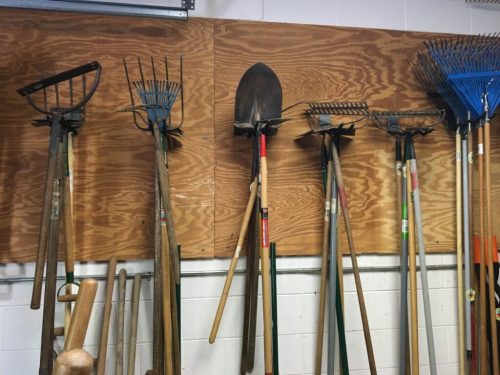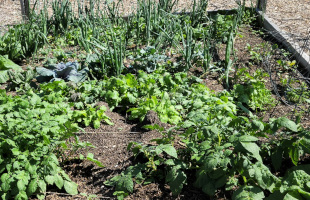
As garden season winds down, it is a good idea to take some time to maintain your garden tools before you put them away for the winter. There are five parts to good tool care.
Cleaning
Ideally, you wash dirt off your tools after every use. Before you put them away for the year, it is important to clean them. Remove all dirt and debris from them with a garden hose and a stiff brush. If your tools have sticky sap on them, try using alcohol, mineral spirits, or foaming bathroom cleanser to remove the sap.
Disinfecting
After your tools are clean, they need to be disinfected. Ideally, you should do this after each use during the year. However, if you disinfect the tools now, diseases cannot overwinter on them. Use a mixture of 9 parts water and 1 part bleach. Soak the tools for 30 minutes in the disinfectant, then wash the tools with plain water. Bleach is corrosive so it must be washed off before the tools are stored.
Sharpening
Sharpen all the tools that cut and cultivate in your garden. A metal file or honing stone will sharpen the tool and fix any rough edges. It also makes the tool easier to use next year. If you are sharpening hand pruners, this article shows you how with directions and a video. This is a good time to sand off any rust that is present on any of your tools. Sand off any uneven spots on the wooden handles of your tools so they will not cause blisters or let rot in.
Oiling
Apply a light coating of motor oil or honing oil to the metal part of your tools to prevent rust. Use a rag to coat the tool and wipe off the excess oil. Treat the wooden handles with linseed or mineral oil and wipe off the excess. This will keep the handles from getting too dry.
Storing
Store tools away from the elements, off the floor, with each tool on its own hook. With long handled tools such as hoes, hang so the metal part is up and the handle is off the ground.
These tips will keep your tools working right for a lifetime and make gardening easier when spring comes.

Want to learn to garden? My first attempt at gardening ended up in failure. The weeds took over and squeezed the vegetables out. I was very frustrated by this waste of good seed, time, and money. So I became a master gardener and spent a lot of time helping other people avoid or overcome problems in their garden.
In order to help others garden successfully, I have written a book, Vegetable Gardening from the Ground Up, available in an ebook or a paperback from Amazon. It is also in Kindle Unlimited.

